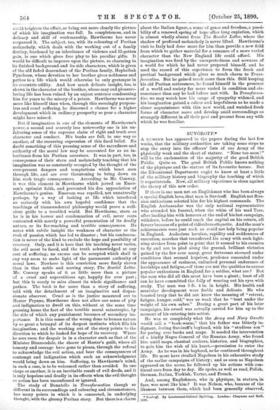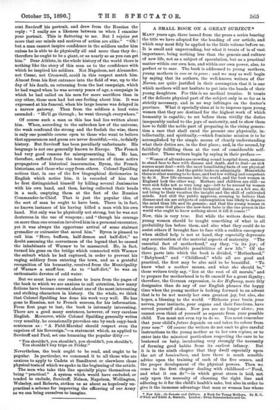SUV6ROFF.*
A Al.73101:01 has appeared in the papers during the last few weeks, that the military authorities are taking some steps to stop the entry into the officers' lists of our Army of the physically weak and the short of stature. " None too soon!" will be the exclamation of the majority of the good British Public. Quite so. The good British Public knows nothing of the physique and the stature of its favourite heroes. Bat the Educational Department ought to know at least a little of the military history and biography the teaching of which it superintends. Now, all military experience is clean against the theory of this new order.
If there is one man not an Englishman who has been always a special English hero, that man is Suvoroff. English not Rus- sian enthusiasm selected him for his highest commands. The English Ambassador was the only national representative who attended his funeral, when the whim of his mad Tzar, after loading him with honours at the end of his last campaign, withdrew, before he could reach the capital on his return, all favour because of a point of ridiculous etiquette. And the man's achievements were just such as could not help being popular in England. Audacious heroism, rapidity and suddenness of execution, marches that transferred his army with such light- ning strokes from point to point that it seemed to his enemies to fly and not to plod along the ground, brilliant victories gained by the few over many, great fortresses stormed under conditions that seemed hopeless, prudence concealed under the appearance of rashness, unlimited personal endurance of hardships and fatigue,—if these are not the qualities to arouse popular enthusiasm in England for a soldier, what are P But the man who did all this must have been a giant ; least of all can he have committed the folly of wearing out his eyes with study. The man was 5 ft. 4 in. in height. His health and muscular development were feeble and delicate. He who boasted truly that he did not know the meaning of "retreat, fatigue, hunger, cold," was so weak that he " bent under the weight of his own sabre." During a great part of his later campaigns, his sword was actually carried for him up to the moment of his entering into action.
He was so completely what the Army and Navy Gazette would call a " book-worm," that his father was bitterly in- dignant, during Suvoroff's boyhood, with his " studious son " for poring over books and maps. It needed the intervention of a kindly Negro General of the Russian Army, who found him amid maps, classical authors, histories, and biographies, to gain him the wish of his heart,—permission to enter the Army. As he was in his boyhood, so he continued throughout life. He must have rivalled Napoleon in his exhaustive study of the earlier campaigns of history; and as soon as Napoleon appeared on the scene, he followed up his actions with con- tinual care from day to day. He spoke, as well as read, Polish, German, Italian, Turkish, Tartar, and French.
And, among Englishmen, who in physique, in stature. in face, was most like him P It was Nelson, who, because of the likeness between them, which had been generally observed,
• Sav6roff. By Lienteziant-Colonel Spalding. London: Chapman and Hall. 1890. sent Suvoroff his portrait, and drew from the Russian the reply : " I really see a likeness between us when I examine your portrait. This is flattering to me. But I rejoice yet more that our minds and motives of action are alike." " Oh ! but a man cannot inspire confidence in the soldiers under him unless he is able to do physically all and more than they do ; therefore he ought to be a giant, or as nearly so as you can get him." Dear Athlete, in the whole history of the world there is nothing like the story of this man as to the confidence with which he inspired his soldiers. Not Napoleon, not Alexander, not Caesar, not Cromwell, could in this respect match him. Almost from his first entrance into the field of war, up to the day of his death, on returning from the last campaign, which he had waged when he was seventy years of age, a campaign in which he had called on his men for more sacrifices than in any other, those men had but one feeling about him. It was expressed at his funeral, when his large hearse was delayed in a narrow gateway. Then from the soldiers a loud voice ascended " He'll go through ; he went through everywhere."
Of course such a man as this has had lies written about him. When, according to the unbroken law of the universe, the weak confound the strong and the foolish the wise, there is only one possible course open to those who want to believe that appearances and guess are never deceitful,—viz., to falsify history. But Suv6roff has been peculiarly unfortunate. His language is not one generally known to Europe. The French had very good reasons for misrepresenting him. He has, therefore, suffered from the tender mercies of those active propagators of historical inaccuracies, Byron, the French historians, and those who copy from others. Colonel Spalding notices that, in one of the few biographical dictionaries in English which notice him, it is recorded of him that he first distinguished himself by killing several Janissaries with his own hand, and then, having collected their heads in a sack, emptying them at the feet of the Russian Commander-in-Chief. That is just the popular idea of the sort of man he ought to have been. There is, in fact, no known instance of his having killed a man with his own hand. Not only was he physically not strong, but he was not dexterous in the use of weapons ; and " though his courage on more than one occasion involved him in a personal encounter, yet it was always the opportune arrival of some stalwart grenadier or cuirassier that saved him." Byron is pleased to call him "Hero, buffoon, half-demon and half-dirt," no doubt assuming the correctness of the legend that he caused the inhabitants of Warsaw to be massacred. He, in fact, turned his guns on the bridge which connected with Warsaw the suburb which he had captured, in order to prevent his raging soldiery from entering the town, and as a grateful recognition of his humanity, received from the Municipality of Warsaw a snuff-box. As to " half-dirt," he was an enthusiastic devotee of cold water.
But we must leave our readers to learn from the pages of the book to which we are anxious to call attention, how many fictions have become current about one of the most interesting and striking characters in history. On the whole, we think that Colonel Spalding has done his work very well. He has gone to Russian, not to French sources, for his information. From first page to last, the book is intensely interesting. There are a good many sentences, however, of very careless English. Moreover, while Colonel Spalding generally writes very sensibly, he occasionally provokes one by such copy-book sentences as : " A Field-Marshal should respect even the caprices of his Sovereign,"—a statement which, as applied to Suvoroff and Paul, set one humming the popular ditty :—
" You shouldn't, you shouldn't, you shouldn't, you shouldn't, You shouldn't buy tripe on Friday."
Nevertheless, the book ought to be read, and ought to be popular. In particular, we commend it to all those who are anxious to apply to Cadets at Sandhurst or elsewhere those physical tests of which we spoke in the beginning of the article.
The men who take this line specially pique themselves on being " practical." A system which would have excluded, or tended to exclude, SuvOroff, Nelson, Napoleon, Wellington, Wolseley, and Roberts, strikes us as about as hopelessly un- practical a scheme for improving the officering of our Army as we can bring ourselves to imagine.







































 Previous page
Previous page